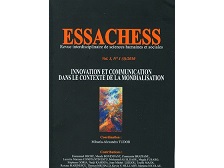L'innovation dans la recheche sur les effets de cadre. L'enseignement axé sur l'acquisition des langues secondaires
Innovation in Researching the Effects of Frame - Focused Instruction on Second Language Acquisition
Author(s): Elena SokolovaSubject(s): Social Sciences
Published by: ESSACHESS
Keywords: innovation; instruction; frame; cognitive
Summary/Abstract: In the context of globalization the research of innovative teaching methods and techniques becomes relevant. The traditional teaching approach where the training of practice material is preceded by rule-presentation (explanation + mechanical formoriented practice) doesn’t meet the requirements of constantly developing rational language processing. Contemporary studies are considering the ways how to allow second language learners to be rational in the sense that their mental models of language functioning are the most optimal. This paper outlines current cognitive perspectives on second language acquisition. Language learning involves the acquisition of frame instructions or input-processing instructions (explanation + structured-input activities). Competence and performance both emerge from the dynamic system of frequently used memorized constructions. Frames are dynamic contextualized activation of stereotyped situations. This system proves to be rational since it aims at optimal reflection of prior first language usage and induces learners to think consciously about some sort of rule in order to work out the meaning. The frame–based instruction consists of activities which present learners with a stimulus and require them to respond choosing the appropriate language form for communication. The targeted feature of such communicative tasks has two aims: 1). to stimulate communicative language use and 2). to target the use of a particular predetermined linguistic feature. The empirical research shows that frame-focused tasks direct learners attention to the meaning realized by the target form. Methodological basis includes some theoretical propositions from recent Relevance theory and cognitive linguistics.
Journal: ESSACHESS - Journal for Communication Studies
- Issue Year: III/2010
- Issue No: 02
- Page Range: 163-170
- Page Count: 7
- Language: English

